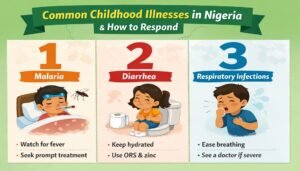Pregnancy is a life-changing experience, but for many Nigerian women, it comes with numerous challenges. A healthy pregnancy isn’t just about avoiding complications; it’s about ensuring physical, mental, and emotional well-being for both mother and baby. In this post, i will highlight the best pregnancy care tips for Nigerian women, addressing cultural, environmental, and healthcare realities specific to Nigeria. Maternal health in Nigeria is critical, yet the country faces one of the highest maternal mortality rates globally. According to the World Health Organization (WHO), Nigeria accounted for nearly 12% of global maternal deaths in 2020 (WHO Maternal Mortality). In 2020 alone, over 80,000 women died from pregnancy-related complications, largely due to preventable causes like severe hemorrhage, pre-eclampsia, and obstructed labor. Common barriers include limited access to quality healthcare, especially in rural areas, widespread misinformation, and cultural practices that sometimes discourage timely medical care.
Understanding Common Pregnancy Challenges in Nigeria
Before we dive into the tips, let’s look at some common challenges Nigerian women face during pregnancy:
- Financial limitations preventing visits to private hospitals.
- Inadequate nutrition due to food insecurity or cultural food restrictions.
- Limited access to quality antenatal care, especially in rural areas.
- Dependence on Traditional Birth Attendants (TBAs) who may lack modern medical training.
- Lack of awareness about danger signs such as high blood pressure or bleeding.
- Cultural stigma around discussing pregnancy complications.
Addressing these issues through education and practical steps is essential for safe motherhood in Nigeria.
Practical Pregnancy Care Tips For Nigerian Women
Essential Pregnancy Care Tips for Nigerian Women in the First Trimester
Your first trimester sets the foundation for your baby’s development. Key tips include:
- Register for antenatal care early — ideally at a government or reputable private hospital.
- Start taking prenatal vitamins, especially folic acid, to prevent birth defects.
- Avoid harmful substances like alcohol, tobacco, and unprescribed herbal mixtures.
- Get tested for common infections like malaria, HIV, hepatitis, and syphilis.
- Listen to your body. Fatigue, morning sickness, and emotional swings are normal but seek help if severe.
- Don’t skip antenatal visits. Antenatal care in Nigeria is vital for monitoring maternal and fetal health. Attending at least four antenatal sessions, starting as early as 6–8 weeks of pregnancy, lowers your risk of complications by up to 70%, according to WHO Antenatal Guidelines
Healthy Nutrition and Diet Pregnancy Care Tips for Nigerian Women

Food plays a key role in your health during pregnancy. Here are simple, local tips:
- Eat a balanced diet: Include fruits, vegetables, whole grains, lean meats, beans, and dairy.
- Iron-rich foods: Eat ugu leaves, ewedu, ogbono, and okra to prevent anemia.
- Protein sources: Beans, eggs, fish, and locally sourced chicken help your baby’s growth.
- Drink clean water and avoid sugary sodas or unsafe street foods.
- Reduce salt and fried foods to prevent swelling and high blood pressure.
Tip: Avoid eating raw or undercooked meats and unpasteurized dairy to reduce infection risk.
Dr. Bosede Afolabi, a renowned obstetrician at Lagos University Teaching Hospital (LUTH), emphasizes, “Early nutrition is critical. Nigerian women should prioritize local foods like ugu and beans, which are cost-effective and packed with nutrients to prevent deficiencies.” Read also: Boost Immunity Naturally With Nigerian Foods
Community and Family Support Pregnancy Care Tips for Nigerian Women

You’re not alone in this journey. Lean on your support system:
- Involve your spouse/partner in antenatal visits when possible.
- Let trusted family members help with chores.
- Connect with other pregnant women through local churches, mosques, or online groups.
- Educate those around you about supporting pregnant women instead of burdening them with superstitions or unrealistic expectations.
Exercise in Pregnancy Care Tips for Nigerian Women
Staying active helps you feel better and prepares your body for labour.
- Take daily walks, even if it’s just around your compound.
- Practice gentle stretching or pregnancy-safe yoga.
- Avoid lifting heavy loads or stressful house chores.
- Get plenty of rest and sleep on your side as your belly grows.
- Wear comfortable clothing and flat shoes to reduce falls.
Consult your healthcare provider before starting any exercise routine.
Mental Health Pregnancy Care Tips for Nigerian Women
Pregnancy is not just physical — your emotional well-being matters.
- Talk to a trusted friend, family member, or support group.
- Practice prayer, mindfulness, or meditation to reduce anxiety.
- Avoid stressful environments when possible.
- If you feel persistently sad or overwhelmed, seek help from a mental health professional — mental health is as important as physical health.
Pregnancy Care Tips for Nigerian Women on a Budget
Worried about high hospital bills? Here are budget-friendly tips:
- Use government primary health centres (PHCs) where services are subsidized.
- Ask about NHIS (National Health Insurance Scheme) coverage for antenatal and delivery.
- Attend free antenatal classes organized by some NGOs and faith-based clinics.
- Prepare your hospital bag early with affordable, locally sourced supplies.
Pro Tip: Apps like Mamalette or platforms like mDoc Nigeria offer free pregnancy tips.
Pregnancy Symptoms: Top Care Tips For Nigerian Women
Pregnancy symptoms like nausea, fatigue, swelling, and back pain are common but manageable with safe, natural remedies. Here are some pregnancy care tips for Nigerian women to ease discomfort:
- Nausea: Sip ginger tea (made from fresh ginger root, widely available in Nigerian markets) or eat small, frequent meals like boiled yam or plantain to settle the stomach.
- Fatigue: Rest when possible and drink plenty of water. Eating iron-rich foods like ugu or spinach can boost energy levels.
- Swelling: Elevate your feet and avoid tight clothing. Reduce salt intake, but don’t eliminate it, as it’s essential for fluid balance.
- Back Pain: Practice gentle stretches or prenatal yoga (if approved by your doctor). Sleeping on your side with a pillow between your knees can also help.
Dr. Maryam Yusuf, a community midwife in Kano, advises, “Use local remedies with caution. Not everything our grandmothers used is safe during pregnancy.” According to a UNICEF Nigeria Report on Maternal Health, up to 30% of pregnant women report using unsafe herbal remedies without medical advice.
Delivery Care Tips For Nigerian Women

Choosing where to deliver is a critical decision. In Nigeria, options include hospitals, maternity centers, and traditional birth attendants (TBAs). Hospitals and maternity centers with skilled birth attendants (SBAs) are the safest, as they can manage complications like postpartum hemorrhage. However, TBAs remain popular in rural areas due to accessibility and cultural familiarity. A 2018 study in the Journal of International Women’s Studies found that 25% of rural Nigerian women deliver at home with TBAs due to cost and distance barriers. While TBAs may offer emotional support, they often lack training to handle emergencies, increasing risks. “Home births should only be an option if the TBA is skilled and there’s a referral plan,” says UNFPA Nigeria’s maternal health lead (UNFPA Nigeria).
Creating a birth plan is a practical step for safe delivery. Here’s what to include:
- Preferred Location: Choose a hospital or maternity center with emergency obstetric care. Confirm it’s accessible and affordable.
- Emergency Contacts: List your doctor, midwife, and a family member’s contact details.
- Hospital Bag: Pack essentials like sanitary pads, baby clothes, toiletries, and medical records. Include snacks like groundnuts or biscuits for energy during labor.
- Support Person: Decide who will accompany you, such as your husband or a trusted relative.
UNFPA Nigeria stresses, “A birth plan empowers women to make informed choices, reducing delays in accessing care, which is critical in emergencies.”
Postnatal Care Tips For Nigerian Women
Postpartum care is vital for recovery and bonding with your baby. Rest is non-negotiable in the first few weeks. Delegate household chores to family or community members, a common practice in Nigerian culture. Nutrition remains key—opt for iron-rich soups like egusi or vegetable stew to replenish blood loss. Hydration is equally important; drink water or pap (fermented millet porridge) to support breastfeeding.
Postnatal depression affects up to 15% of Nigerian mothers, according to She Writes Woman, a mental health NGO. Symptoms include persistent sadness, irritability, or difficulty bonding with the baby.
“Postpartum blues are real. Don’t be ashamed. Talk to someone,” urges Hauwa Ojeifo, founder of the She Writes Woman mental health initiative (She Writes Woman).
A Nigerian mother, Mrs. Chioma Adebyo, shares, “After my second child, I felt overwhelmed and cried often. Joining a mothers’ group in my church helped me feel less alone and gave me practical tips for coping.” Read also: Benefits of Good Sleep for Mental Health
Your baby isn’t the only one who needs care—you do too. According to the Nigeria Demographic and Health Survey, over 60% of new mothers in Nigeria do not attend a postnatal checkup.
Common Complications in Pregnancy Care Tips For Nigerian Women
Awareness of complications can save lives. Contact your healthcare provider immediately if you experience:
- Bleeding: Could indicate miscarriage, placenta previa, or placental abruption.
- Persistent Headaches or Blurred Vision: Signs of pre-eclampsia, a leading cause of maternal deaths in Nigeria.
- Fever: May signal infections like malaria, common in Nigeria and dangerous during pregnancy.
- Severe Abdominal Pain: Could indicate ectopic pregnancy or labor complications.
- Swollen hands or face: This may be a sign of preeclampsia
- Decreased baby movement: A noticeable reduction in fetal movement may signal fetal distress.
If you notice any, seek care immediately. According to the Federal Ministry of Health, delayed response contributes to over 60% of pregnancy-related deaths
Frequently Asked Questions
- Can I take herbal remedies while pregnant?
Avoid herbal remedies unless prescribed by a doctor. Many traditional herbs, like agbo, lack safety data and may harm the fetus. Always consult your healthcare provider. - How often should I visit the clinic?
The WHO recommends at least eight antenatal visits: monthly until 28 weeks, biweekly until 36 weeks, then weekly until delivery. - What are safe foods to eat during pregnancy in Nigeria?
Include ugu, okro, moi moi, millet, and fish like tilapia for iron, folate, and omega-3s. Avoid raw or undercooked meat to prevent infections. - Is it safe to have sex during pregnancy?
Yes, unless your doctor advises against it due to complications like placenta previa. Discuss with your healthcare provider for personalized advice. - Can malaria drugs affect my baby?
WHO-approved malaria drugs like sulfadoxine-pyrimethamine are safe during pregnancy when prescribed. Untreated malaria poses greater risks. - How do I manage vomiting naturally?
Sip ginger tea or eat small meals like boiled yam. Avoid spicy or greasy foods. Persistent vomiting requires medical attention.
Final Thoughts
The best pregnancy care tips for Nigerian women empower you to take charge of your health and your baby’s well-being. Despite challenges like limited healthcare access and cultural misconceptions, prioritizing antenatal care, nutrition, and emotional health can lead to safer pregnancies and deliveries. Seek trusted information from healthcare providers, avoid harmful practices, and lean on community support.
Subscribe to our newsletter for more health tips, share this post with other Nigerian women, join our free WhatsApp or Telegram support group for pregnant women, or explore local tools at HealthsClinic.com. Your health is your wealth—prioritize it today!
This post is for educational purposes only: therefore, consult your doctor before making any medical decision.
Kindly Subscribe, Like and Share this post.





Pingback: Top Warning Signs of Fibroids in Nigerian Women
Pingback: Common Women’s Health Disorders in Nigeria Explained
Pingback: Intermittent Fasting Meal Plan for Beginners
Pingback: Top 20 Causes of Convulsions in Nigeria